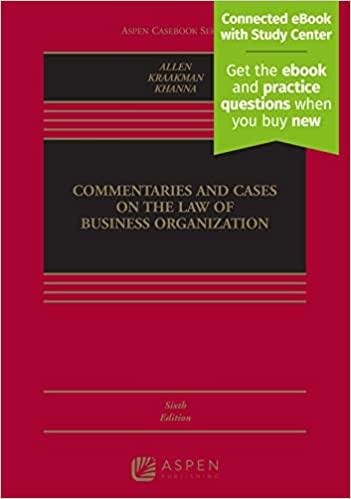Question
CASE In February 1995, Ronald Krupinski met with Frank Viola and William Deyesso to discuss investing in an adult entertainment club, to be named Centerfolds,
CASE
In February 1995, Ronald Krupinski met with Frank Viola and William Deyesso to discuss investing in an adult entertainment club, to be named "Centerfolds," in Providence, Rhode Island. At the meeting, Krupinski claims it was agreed that he was to receive a 33 percent ownership interest in Centerfolds, and when the club opened, he would work as a manager and earn a salary of $52,000 annually plus bonuses.
In May 1995, Viola purchased Scharnhorst as the operating entity for Centerfolds. Viola, Deyesso, and others became officers and shareholders of Scharnhorst in December 1995 through appropriate corporate action.
Following the purchase, Krupinski began preparing the club for its opening, which officially occurred in February 1996. Due to an issue with the adult entertainment license, the club was forced to close shortly after opening. As a result of Centerfold's temporary forced closure, Krupinski agreed to reduce his ownership interest in the club to 25 percent.
Krupinski again served as a manager of the club when it reopened in August 1996. Krupinski served in that capacity until July 1997 when he claims he was terminated without cause and without justification. Krupinski did not have a written employment agreement during his tenure as manager.
Devesso claims Krupinski was terminated due to his participation in a purported credit-card scam through the altering of customer receipts, improper conduct with the club's employees, and excessive drinking.
The site where Providence Centerfolds operated was taken by eminent domain in 2001. Once Centerfolds closed and Devesso failed to timely locate a new building, Devesso proceeded to open other clubs in Massachusetts under the name Centerfolds, using some of the tangible property from the Providence club. Krupinski alleges that Deyesso breached the original agreement with him by excluding him from participating in those new, additional clubs.
On October 7, 2005, Scharnhorst's corporate charter was revoked by the Rhode Island Secretary of State due to its failure to file its Annual Report for the year 2005. Krupinski's original complaint was filed on July 10, 2007, and the current, operative complaint was filed on February 8, 2012. On April 12, 2012, the court issued a decision dismissing Counts Il through VIll of the complaint. Accordingly. the only remaining cause of action in this matter-which is now the subject of defendant's summary judgment motion--is Count I, setting forth a claim for breach of contract brought individually against Deyesso.
RULE
Rule:The rule on this case was "[A] preincorporation contract may by adopted, ratify, accepted orratify by a corporation when properly organized, resulting in corporate lability on the contract.Katz v. Prete, 459 A 2d81,86 (R.I 1983)
WHATS THE APPLICATION
Application: What legal and factual analysis does the court go through in order to reach a decision? (This must be written in your own words. You should play the role of a reporter, summarizing the analysis the Court went through in reaching its decision.)
WHAT WOULD BE THE APPLICATION OF THIS CASE ?
Step by Step Solution
There are 3 Steps involved in it
Step: 1

Get Instant Access to Expert-Tailored Solutions
See step-by-step solutions with expert insights and AI powered tools for academic success
Step: 2

Step: 3

Ace Your Homework with AI
Get the answers you need in no time with our AI-driven, step-by-step assistance
Get Started


